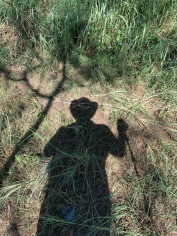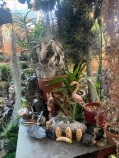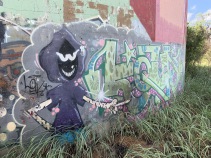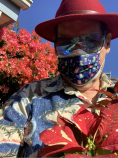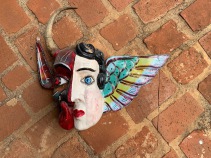Facing Trauma
Care for the Care Provider
If you are attending this little gathering in Wyoming, or are considering it, I would recommend you also browse through this web page and see what catches you fancy, what you would like to know more about, and let me know. You can use the comment field at the bottom.
I am publishing the process here. To give some idea of what this experience is about.
I don't know in advance what will be taught in this class. I don't know what the people coming will be wanting or needing. There are things I think are important and I will prepare in those places. I can tell here some of the areas I have knowledge, skill and proven effectiveness.
I Trust the Importance of Play
Play works so well because it makes you not attend to something that is really important. Control is unseen by the controlled. The body of you hides from the view of you the incomprehendable polyphasic complexity of its processes so you can minimally interfere in the serious workings of you.
Serious Play is the best mode to learn in. It's funny how well this is known and how little practiced. At a societal level we seem not to trust what we know. By "what we know" I mean what science tells us, what the experts say. Research by experts has also shown that expertise is overtated and oversold. Research by experts is able to show that becoming an expert at a thing doesn't mean you get any better at doing that thing. Nourishig curiousity and imagination.
Safety
Safety is important. This is no Cobra Kai dojo. I believe in the importance of letting people fail... into a safety net. Safety is a mutual responsibility. It is seldom true that when we feel unsafe we are in peril. You might invite yourself to stop and ask if there is clear and present danger or is this a ghost.
Movement –– Place –– Relationship : Intrigued by Triangles & Triunity
Trauma and Care
There are a number of arenas I have competence. I just turned 74 and something comes with that many years. Contrariwise the aged can get ignored. I think I am still learning more than I am forgetting. A broad term to describe our particular arena is Care of Others. I am cautious in using the word 'healing' but it can apply. I am also cautious with words like 'therapy' but that too can apply (if you happen to be a therapist).
Care is a very broad word, providing care (as a gift or as a commodity) is something that all of us do. It is an exceedingly rare person who cares for nothing, for nobody. For quite a few people providing care is a full time activity. Some of this large group make their living at it, some get no money in exchange.
How much of your time is given over to care providing? Brushing your teeth is an act of caring. If you are in an intimate relationship you will be doing much to care for the other. If you have children you are a care provider. You may care for a pet, the land, for a river, for a plant, for a shrine. People, other living creatures, non-living things: all these can be objects for which care is provided.
The way we normally think of the rendering of care it is done at a cost to the carer. It can cost a lot. Bankruptcy of a care giver is called burnout. It is also somwrimes called "compassion fatigue,' a term I detest.
Sometimes burnout is referred to as secondary traumatic stress. Treating traumatic stress, particularly posttraumatic stress disorder, has been a central concern of mine as a professional care provider, i.e., as a therapist, over the course of my career.
One of the things I learned early on is that traumatic stress is contagious. You run the risk of getting it from treating it. I have a lot of ideas of why and how this happens. The main thing I have learned, that bumped my effectiveness to near 100%, is my practice of feeling it and letting it go. Then I noticed that if I did nothing but that with another person it was sufficient. Doing nothing but be there, feel, and let go.
This I had actually learned while doing bodywork, a method that can feel like some form of magic. The trauma is in the body. Feelings and thoughts are simply the body doing stuff, particular patterns of 'tensions' rippling in the body.
I have to offer a different way of seeing and thinking about the body, that is how we conceptualize the body. The body we work on is always a concept. That statement will be found by many as difficult to understand. Concepts are abstractions; bodies are concrete things.
Things are always different to what we think they are. Whatever direction you come at it from, none of them gets it all right.
Movement is important. Movement is the base of everything. Is there "pure" movement? We will play is if there is. Movement has a feel, leaves a trace, even if we are not moving. There are games to help you catch hold of movement.
Place is also important, place and orientation. Place is poorly understood and much neglected. We know and we don't know how much place is a part of us. I dislike that word part and all of its synonyms. I should write it as part. It is always arbitrary to divide things into parts, particularly true of the body.
I will not know how we begin until we begin. There is a good chance we will begin by facing into the world and discovering where home is. Home is a sense of well-being. Ortho-Bionomy teaches about preferred position (you will learn about this). It is the position of greatest comfort. I am becoming uncomfortable with seeking comfort.
Because of covid risks and fears we will likely maintain some distance from one another (unless you come with someone in your pod). We will start with self care. That is the doorway into caring for the other.
The other may be people of any sort. It may be human people, animal people, plant people, or what we call objects. We cannot know how subjectivity spreads itself through the worlds.
We have bought some bad goods. The idea that we all live in one world is not a good idea. That idea is called "reductionism." It also says we are made of parts. The parts are made real by giving them names. We will strip away the names of things.
